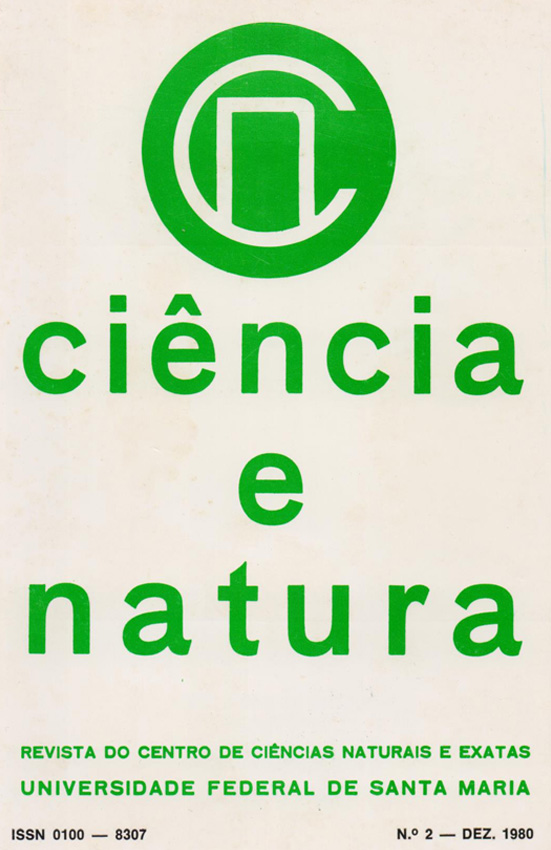Composição, leis de macla e estado estrutural dos plagioclásios de rochas vulcânicas da Bacia do Paraná
DOI:
https://doi.org/10.5902/2179460X24865Resumo
Plagioclásios de distintos derrames de lavas, da extremidade meridional da Bacia do Paraná, foram determinados opticamente por meio das leis macla Albita-CarIsbad, Carlsbad e Albita, que são as mais frequentes.
Nas rochas basálticas de granulação uniforme, a composição geral do plagioclásio situa-se entre An45-An65, com uma concentração de valores no intervalo An50-An55. Nos tipos inequigranulares, os fenocristais mostram, geralmente, valores acima de An60. No primeiro caso, os plagioclásios são do tipo vulcânico e de transição; no último, os fenocristais são, comumente, do tipo plutônico ou de transição refletindo, assim, a história térmica das rochas.
O conhecimento do estado estrutural dos plagioclásios das rochas vulcânicas da Bacia do Paraná favorece a precisão das medidas ópticas, para o cálculo das porcentagens de anortita, permitindo a seleção da curva determinativa (alta ou baixa temperatura) mais adequada.
Downloads
Referências
BURRI, C.; PARKER, R. L. & WENK, E. Die optieche orientierung der plagioklase. Basel, Birkhauser Verlag. 1967. 334 p.
RÜEGG, N.R. Plagioclásios plutônicos e vulcânicos em diabásios da Bacia do Paraná. Rev. Bras. Geoc., São Paulo, 2(J):8-l7, 1972.
SARTORI, P.L.P. & GOMES, C.B. Composição químico.mineralôgica das últimas manifestações vulcânicas na região de Santa Maria, RS. An. acad, bras. ciênc., Rio de Janeiro, 52(1): 125-133, 1980.
SARTORI, P.L.; MACIEL FILHO, C.L. & MENEGOTTO,E. Contribuição ao estudo das rochas vulcânicas da Bacia do Paraná na região de Santa Maria, RS. Rev. Bras. Geoc., São Paulo, 5(3): 141-159, 1975.
SLEMMONS, D.B. Determination of volcanic and plutonic plagioclases using a three- or four-axis universal stage. Geol. Soc.Amer., Special Paper, 69: 1-64, 1964.
Downloads
Publicado
Como Citar
Edição
Seção
Licença
Para acessar a DECLARAÇÃO DE ORIGINALIDADE E EXCLUSIVIDADE E CESSÃO DE DIREITOS AUTORAIS clique aqui.
Diretrizes Éticas para Publicação de Revistas
A revista Ciência e Natura está empenhada em garantir a ética na publicação e na qualidade dos artigos.
A conformidade com padrões de comportamento ético é, portanto, esperada de todas as partes envolvidas: Autores, Editores e Revisores.
Em particular,
Autores: Os Autores devem apresentar uma discussão objetiva sobre a importância do trabalho de pesquisa, bem como detalhes e referências suficientes para permitir que outros reproduzam as experiências. Declarações fraudulentas ou intencionalmente incorretas constituem comportamento antiético e são inaceitáveis. Artigos de Revisão também devem ser objetivos, abrangentes e relatos precisos do estado da arte. Os Autores devem assegurar que seu trabalho é uma obra totalmente original, e se o trabalho e / ou palavras de outros têm sido utilizadas, isso tem sido devidamente reconhecido. O plágio em todas as suas formas constitui um comportamento publicitário não ético e é inaceitável. Submeter o mesmo manuscrito a mais de um jornal simultaneamente constitui um comportamento publicitário não ético e é inaceitável. Os Autores não devem submeter artigos que descrevam essencialmente a mesma pesquisa a mais de uma revista. O Autor correspondente deve garantir que haja um consenso total de todos os Co-autores na aprovação da versão final do artigo e sua submissão para publicação.
Editores: Os Editores devem avaliar manuscritos exclusivamente com base no seu mérito acadêmico. Um Editor não deve usar informações não publicadas na própria pesquisa do Editor sem o consentimento expresso por escrito do Autor. Os Editores devem tomar medidas de resposta razoável quando tiverem sido apresentadas queixas éticas relativas a um manuscrito submetido ou publicado.
Revisores: Todos os manuscritos recebidos para revisão devem ser tratados como documentos confidenciais. As informações ou ideias privilegiadas obtidas através da análise por pares devem ser mantidas confidenciais e não utilizadas para vantagens pessoais. As revisões devem ser conduzidas objetivamente e as observações devem ser formuladas claramente com argumentos de apoio, de modo que os Autores possam usá-los para melhorar o artigo. Qualquer Revisor selecionado que se sinta desqualificado para rever a pesquisa relatada em um manuscrito ou sabe que sua rápida revisão será impossível deve notificar o Editor e desculpar-se do processo de revisão. Os Revisores não devem considerar manuscritos nos quais tenham conflitos de interesse resultantes de relacionamentos ou conexões competitivas, colaborativas ou outras conexões com qualquer dos autores, empresas ou instituições conectadas aos documentos.






